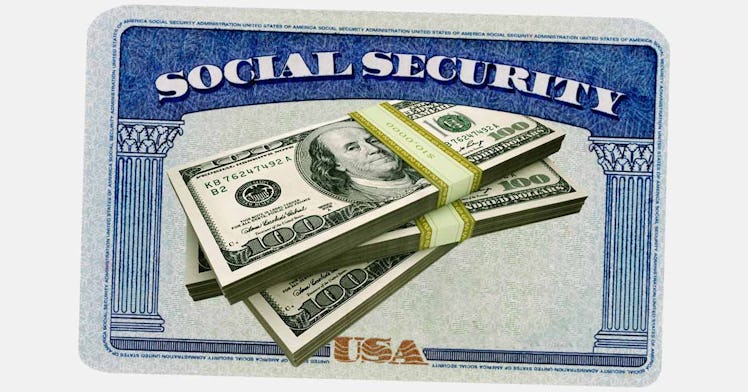Your Retirement is in Danger. This New Bill Might Save It
A new law would support the dwindling funds that power the nation’s largest anti-poverty program by raising taxes on the richest Americans.

Lawmakers in Congress are reintroducing a bill to shore up the future of Social Security benefits, CNBC reports. If passed, the measure would bolster one of the country’s most important anti-poverty measures.
The bill, known as “Social Security 2100: A Sacred Trust,” is designed to add a few more years’ of funds to stabilize Social Security. When you pay your Social Security taxes out of your income, that money goes into these funds — helping make sure everyone eligible gets their benefits. The problem is that those funds are shrinking over time as more people retire and tax rates remain low.
Currently, Social Security funds are expected to run out by 2034, just 13 years from now, according to the Social Security Administration.
That doesn’t mean that no one will get their benefits, it just means that the payouts will be cut to whatever can be covered by payroll taxes as the fund pool will be depleted. The Social Security Administration currently estimates that if that happens, the agency will have enough money to pay out about 78% of the expected benefits to retirees.
This proposed law would extend that deadline of depletion to 2038, according to an estimate from Representative John Larson, chair of the Ways and Means Social Security Subcommittee. It does this in part by raising taxes on the wealthiest Americans. Currently, payroll taxes only apply to the first $142,800 dollars earned someone earns that year, but this law would also tax any wages earned above $400,000 per year.
According to MarketWatch, this is called the “doughnut-hole approach” — where wages are taxed below $142,800 and above $400,000. This would leave a non-taxed middle area that shrinks as the lower maximum, which changes with inflation every year, approaches $400,000, MarketWatch notes.
In a nutshell: If this law were passed, anyone earning over $400,000 per year would see payroll taxes on their first $142,800, no payroll taxes on further wages until they reached an income of $400,000 earned that year, and then payroll taxes on any cash earned in excess of $400,000.
Anyone earning less than $400,000 per year wouldn’t see their taxes go up, except due to the yearly rising of the lower maximum already scheduled to rise from $142,800 to $147,000 next year.
Representative Larson’s office estimated that this change would affect only the richest 0.4% of wage earners.
In addition to raising more money, the new plan would also extend some benefits, such as setting the minimum benefits received at 125% of the poverty level and providing about a 2% increase to the average benefits, CNBC reports.
The bill would also remove a delay on disability support and help caregivers receive more benefits, among other things, notes MarketWatch.
House Democrats introduced the bill hoping to get backing from both President Biden and Congressional Republicans, CNBC reports. And, according to Rep. Larson’s website, a previous version of the bill received support from various Social Security advocates and unions.
Social Security is arguably the nation’s most important anti-poverty effort — singlehandedly, it keeps tens of millions of Americans above the poverty line.
Created during the New Deal era of President Franklin Delano Roosevelt, the program has helped millions of Americans maintain a dignified retirement.
Part of the issue now is simply that there are more people retiring as the Baby Boomers, an extra-large generation, age out of the workforce — meaning there’s more money going out and less coming in. This new law would buy the program a few more years.
But in the meantime, the program churns on, with payouts increasing every year to keep pace with inflation. Due to higher inflation rates this year, next year’s checks will include one of the largest single-year increases in decades — making sure to protect seniors and others as the cost of living in America goes up. And hopefully, this bill — or any bill that would keep the entitlement going — will pass soon.